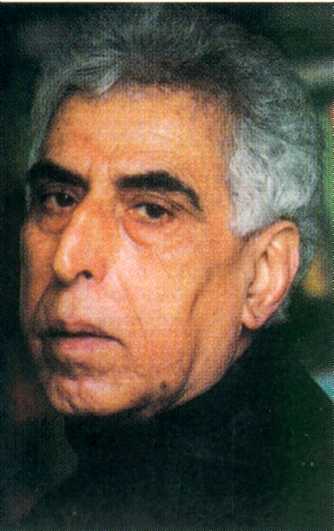Still Life
The house plant
Bends under the heavy air.
On the table
Among a full ashtray and a tobacco bag
Were bills of Gas & Electricity,
The ship sails on the wall
The bird pecks at the singer's head
(A CD cover)
I disturb my room,
It gets narrow.
The ship disappeared
Night sits in the corner
Wrapped up in the thick air.
* Translated by the author.
A Roman Colony
We were Greeks
Our dwellings on the borders
Of the Arabian Desert;
But we have two rivers
And some villages
And farms watered by the two rivers…
Also, we did have poets
Who knew the meters
And wrote about women and flowers.
In Kinnesrin
We built a philosophy school
(It was astonishing that Aristotle's disciples
Came to visit us from time to time
Briefing us about the last manuscripts of Athens)
But we were Greeks
And peasants
So, we didn't manufacture weapons
And didn’t train our boys to be soldiers
(Aristotle’s disciples didn't tell us that their master
Was training the son of Philip the Macedonian to conquer cities! )
The world changes they said
Even the sun will rise from the west…
……………….
………………..
………………..
Now, I'm jabbering,
Alone, in Kyriakos's tavern
In Sidon.
My terra-cotta wine cup blackened
My hair is gray…
And I don't know who to tell
Even in secret
That the Romans have banished me
After we became a colony;
But I think that Kyriakos
Knows that.
The world changes
They say…
Translated by the author
That Rainy Day
Not because a rainy day is strangely knocking at my window like a thief.
Not because I am dwelling in this watery steppe. Not because the sun has dwelt
In the books of travelers and poets. And not because…
I say: I am burdened by waiting angels; the trees are only trees, while I am looking for shade. The falling rain is not deep water. Through the skein of its pulse
Surge rivers, ships of timber and boats of papyrus. The rain does not reach me.
The rain does not moisten my lips. But the green railings there are shimmering
With watery light. And in the distance flowers and headstones quench their thirst.
No more squirrels or birds. My very pores open to the music.
She was in the balcony. The sun rose in the corner of her garden, a bower for
Grassy tones and dry, rustling leaves. The woman was neither looking nor being looked at. The woman was absent. I, alone, was collecting the fragments of her
Image, her limbs, and the memory of a kiss one day in the corner café.
What planted this green in the blue?
Music. A sun from volcanoes islands. The woman is about moving, about taking a form. Now I glimpse a tress of straight hair, the fullness of a lower lip. Music. The balcony becomes the balcony of a house: a small table, two chairs, a bottle of wine, two glasses and some Spanish peaches. And in the corner a cactus. The woman turns. Now we are two. We shall dwell on the balcony. The sun will come to our glasses. We shall see the moment. Music.
The falling rain is falling.
We are behind the balcony’s glass screen. The room is a bit cold. Her room
Was charged with the smell of paint and the aroma of the Kirghiz carpet. The wetness of the day is sticky beneath my shirt. The woman gave me the ember of her lips. Did she slip the ember under my shirt? I feel like a wanderer in a land of Hot Springs and tores. My breathing is the continuous music of strings. My fingers are the bars. My breathing is the continuous music of strings. The music throbs. I don't see any rain. A crystal light falls across the glass screen.
This falling rain is falling.
Falling…
I feel the hot rain.
Minutes.
Minutes only and I shall make with your love a narrow bed.
Music.
Translated by the author
The Tormented of Heaven
Translated from the Arabic by Salih J. Altoma
Naked
We are on our way to Allah
for shrouds we have only our blood;
for camphor, the eyeteeth of wolfish dogs. (*)
The closed cell suddenly swung open
to let in a female soldier
our swollen eyes failed to clearly identify her
perhaps she was from an ambiguous world
she said nothing
she was dragging my brother’s bleeding body, like a worn-out mat.
Barefoot
we will walk toward Allah
with putrid feet
with lacerated limbs
Are the Americans Christians?
in our cell we have nothing for anointing the prostrate corpse
in our cell there is nothing but our blood clotting in our blood
and the odor coming from the continent of slaughterhouses
the Angels will not enter here. The air is stirring
it’s the wings of hell’s bats
The air is still.
O Lord , we waited for you
our cells were open yesterday
we were lying motionless on its floor
and you, O Lord, did not come.
But we are on our way to you
we’ll find the road to you even if you forsake us
we are your dead sons
we have trumpeted our Day of Resurrection
Tell your Prophets to open for us the doors:
the doors of cells and paradise
Tell them we are coming
we washed ourselves with dry sand (**)
the Angels know us all … one by one...
___
(*) Islamic method of bathing a dead body includes washing the body with a mixture of water and camphor.
(**) The poet uses here a Quranic verse which deals with ablution rituals before prayer. It recommends washing with dry sand or clean earth when water is not accessible.” And [if] ye find no water, then take for yourselves clean sand or earth, And rub therewith Your faces and hands.” The Quran IV: 43.
Salih J. Altoma is professor emeritus of Arabic and Comparative Literature at Indiana University.

